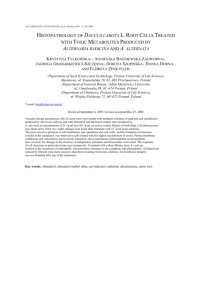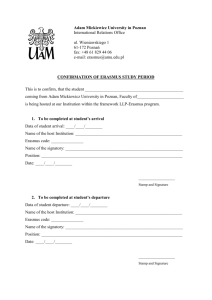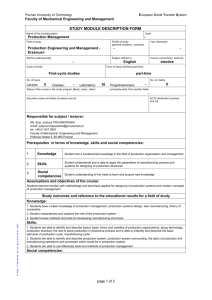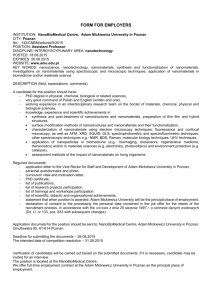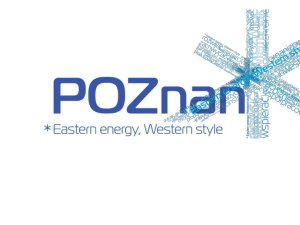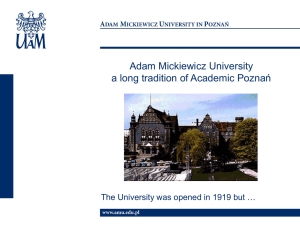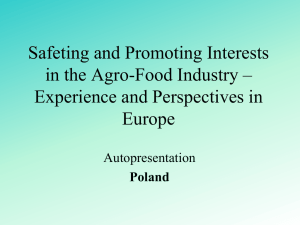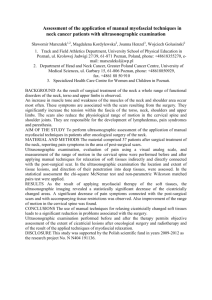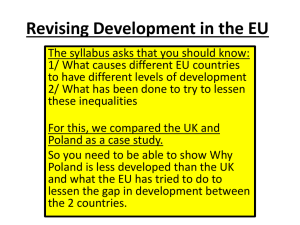WG/MC/Scientific Meeting of COST Action BM1308 Sharing
advertisement
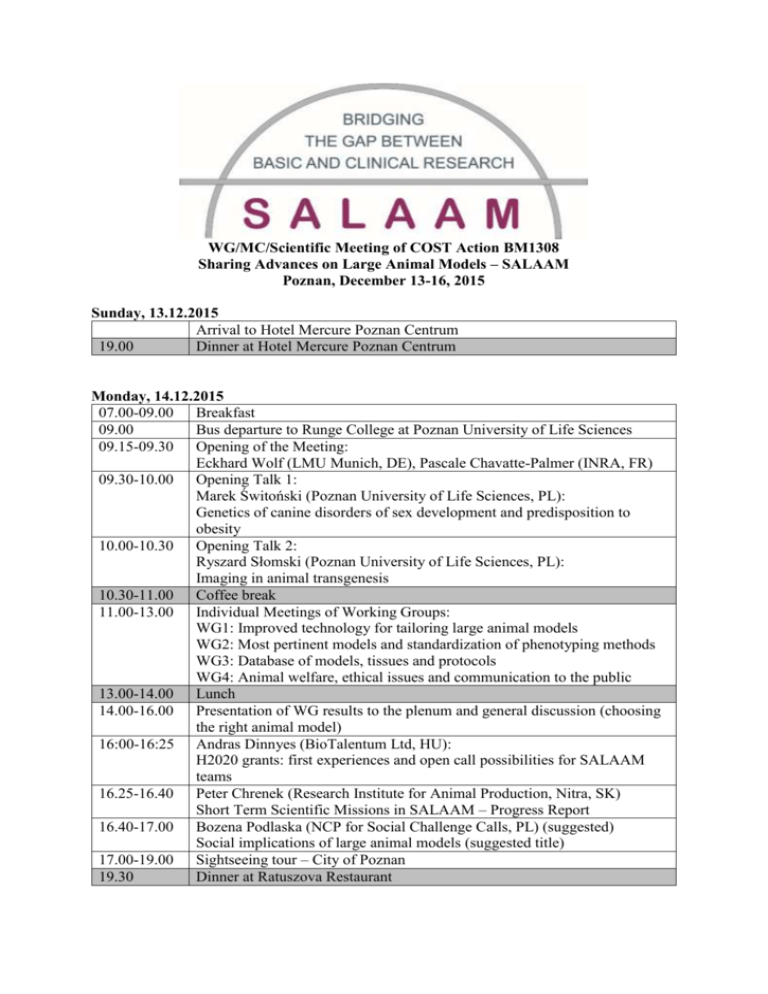
WG/MC/Scientific Meeting of COST Action BM1308 Sharing Advances on Large Animal Models – SALAAM Poznan, December 13-16, 2015 Sunday, 13.12.2015 Arrival to Hotel Mercure Poznan Centrum 19.00 Dinner at Hotel Mercure Poznan Centrum Monday, 14.12.2015 07.00-09.00 Breakfast 09.00 Bus departure to Runge College at Poznan University of Life Sciences 09.15-09.30 Opening of the Meeting: Eckhard Wolf (LMU Munich, DE), Pascale Chavatte-Palmer (INRA, FR) 09.30-10.00 Opening Talk 1: Marek Świtoński (Poznan University of Life Sciences, PL): Genetics of canine disorders of sex development and predisposition to obesity 10.00-10.30 Opening Talk 2: Ryszard Słomski (Poznan University of Life Sciences, PL): Imaging in animal transgenesis 10.30-11.00 Coffee break 11.00-13.00 Individual Meetings of Working Groups: WG1: Improved technology for tailoring large animal models WG2: Most pertinent models and standardization of phenotyping methods WG3: Database of models, tissues and protocols WG4: Animal welfare, ethical issues and communication to the public 13.00-14.00 Lunch 14.00-16.00 Presentation of WG results to the plenum and general discussion (choosing the right animal model) 16:00-16:25 Andras Dinnyes (BioTalentum Ltd, HU): H2020 grants: first experiences and open call possibilities for SALAAM teams 16.25-16.40 Peter Chrenek (Research Institute for Animal Production, Nitra, SK) Short Term Scientific Missions in SALAAM – Progress Report 16.40-17.00 Bozena Podlaska (NCP for Social Challenge Calls, PL) (suggested) Social implications of large animal models (suggested title) 17.00-19.00 Sightseeing tour – City of Poznan 19.30 Dinner at Ratuszova Restaurant Tuesday, 15.12.2015 07.00-08.45 Breakfast 08.45 Bus departure to Runge College at Poznan University of Life Sciences 09.00-9.10 Welcome 09.10-11.00 Session 1: Animal models for metabolic and cardiovascular diseases 09.00-09.30 Overview Talk: Heleen van Beusekom (Erasmus Medical Center, Rotterdam, NL) Cardiovascular models with or without diabetes 09.30-11.00 4 Short Talks (15 + 5 min) selected from the abstracts 11.00-11.30 Coffee break 11.30-13.00 Session 2: Comparative developmental biology 11.30-12.00 Overview Talk: Véronique Duranthon (INRA, FR): Comparative mammalian embryo biology 12.00-13.00 3 Short Talks (15 + 5 min) selected from the Abstracts 13.00-14.30 Lunch and Posters 15.30-17.00 Session 3: Animal Models for Cancer Research 15.30-16.00 Overview Talk: Tatjana Flisikowska (Livestock Biotechnology, TU Munich, DE): Animal models for cancer research – an overview 16.00-17.00 3 Short Talks (15 +5 min) selected from the Abstracts 17.00-18.30 Meeting of MC members 19.00 Concert and dinner at Kórnik Castle Wednesday, 16.12.2015 07.00-09.00 Breakfast 09.00-12:00 Morning of scientific visits Visit to Faculty of Veterinary Medicine and Animal Sciences at Poznan University of Life Sciences Visit to NanoBioMedical Centre at Adam Mickiewicz University 12.00-13.00 Lunch Capital City of Poznań Stołeczne Miasto Poznań Coordinates: 52°24′N 16°55′E Country Poland Voivodeship Greater Poland County city county Established 10th century Town rights 1253 Area City 261.85 km2 (101.10 sq mi) Time zone CET (UTC+1) Summer (DST) CEST (UTC+2) http://www.poznan.pl Poznań is a place where the energy of the New Europe is merged with the civilization of the West. A metropolis with over half-a-million residents, Poznań is situated in the most economically developed region of Poland, closer to Berlin than to Warsaw. Poznanians can be counted on - they are well-educated, competent and welcoming. The city is focused on achieving success, grounded on a 1000-year tradition of competence. The most ambitious of projects and the bravest of visions have a chance to succeed here. The state of Poland was born in Poznań and it was also the location of the Greater Poland Uprising, the only successful armed bid for independence in Poland and a proof of the exceptional resourcefulness of its citizens. The people of this metropolis also stand out in terms of their spirit of enterprise, renowned for generations. During the great economic crisis at the beginning of the 20th century, Poznań managed to establish itself as one of the biggest trading areas in this part of Europe. Today, the Poznań International Trade Fair Centre successfully hosts large international events including the 2008 United Nations IPCC climate conference and a 2010 meeting of the delegations of 46 ministers of culture from Europe and Asia, under the auspices of the AsiaEurope Meeting. The city's sports infrastructure allows for the organisation of major international sporting events. In the opinion of experts, Poznań has one of the most beautifully located regatta courses in the world and hosts one of the largest street races in Europe- the Poznań Marathon. Poznań is also becoming famous around the football stadiums of Europe for the passion of the fans of Lech Poznań-the best supported club in Poland. Poznań cultural climate is formed by the wide range of entertainment on offer. Major international events hosted here include: Malta Festival - the biggest theatre festival in Poland, Dancing Poznań - which has been attracting dancers from all over the world for 17 years and the Made in Chicago Festival - the only festival of the Chicago Jazz School in Europe. The programme is complemented by small but quickly growing events - the Animator Festival - the biggest festival of animated films in Poland, the Ethno Port Festival - recognised as one of the best 25 world music festivals in the world and Transatlantic - an event focusing on film scores. By both realizing professional challenges efficiently and spending our free time creatively, we can look on Poznań as a City of Work and a City of Play. Meeting hotel Hotel Mercure Poznan Centrum Roosevelta 20 60-829 Poznan - Poland Phone +48 61 8558000 Fax +48 61 8558955 H3393@accor.com http://www.mercure.com/gb/hotel3393-hotel-mercure-poznancentrum/index.shtml The 4-star Mercure Hotel Poznan Centrum is located in the business area of Poznan, close to the fair grounds and within walking distance of the Old Market Square. 15 minutes drive from the airport, 5 minutes walk from the main train station. Enjoy our excellent conference facilities, Winestone Restaurant and the hotel's own patisserie. The hotel has 228 airconditioned rooms with free WIFI access, fitness centre and sauna, and a large, secure car park. The 4-star Mercure Hotel Poznan Centrum is located in the business area of Poznan, close to the fair grounds and within walking distance of the Old Market Square. 15 minutes drive from the airport, 5 minutes walk from the main train station. Enjoy our excellent conference facilities, Winestone Restaurant and the hotel's own patisserie. The hotel has 228 air-conditioned rooms with free WIFI access, fitness centre and sauna, and a large, secure car park. Meeting venue Kolegium Rungego Wojska Polskiego 52 60-637 Poznań Eclectic, historic property refers both to the tradition of neo-renaissance. It was built in 1914, for the marksmen's society - hence the date 1253 on the portal (taken as the year of birth of Poznan brotherhood). In 1920 the building was sold to the Poznań University. The name commemorates Stanisław Runge - Rector of the University in the years 1933-1936. In 1951, the College took over the newly created College of Agriculture in Poznan, later Agricultural University (from 1972), and today's University of Life Sciences (since 2008). Dinner, December 14 Ratuszova Restaurant Stary Rynek 55 (Old Market Square 55) 61-772 Poznań Phone/Fax +48 618510513 +48 506079185 info@ratuszova.pl http://ratuszova.pl/en/ The Ratuszova Restaurant kindly invites all visitors of Poznań who are keen on tasting traditional Polish cuisine. Some of our specialties include soup of duck with soft, homemade noodles, roasted duck with apples as well as venison dishes. All enthusiasts of Slow Food culture, aficionados of healthy eating and gourmets of unique flavours are recommended to try our special dishes prepared with the innovative Sous Vide method. Also, as it is our priority to make our guests feel at home, our menu has been enriched with classic dishes of international cuisine. As much as we embrace innovation and experiment in our seasonal dishes and decor, we also remain consistent in maintaining high quality of all our base ingredients, selecting exlusively original products to create our menu. Assisting you in your culinary adventure is professional and amiable staff, right there to make your visit a truly unforgettable experience. Kórnik Castle The Kórnik Library of the Polish Academy of Sciences Biblioteka Kórnicka PAN Zamkowa 5 62-035 Kórnik Phone +48 61 8170081 Fax +48 61 8171930 bkpan@bkpan.poznan.pl http://www.bkpan.poznan.pl/ Kórnik Castle (Polish: Zamek w Kórniku or Zamek Kórnicki) was constructed in the 14th century. The current neogothic design and remodeling was done by the architect Karl Friedrich Schinkel for Tytus Działyński and the son Jan Kanty Działyński. After Jan's death, his brother-in-law Count Władysław Zamoyski received the castle in Jan's will. Shortly before his death in 1924, the childless count willed the castle, along with an extensive art collection and the Kórnik Arboretum to the Polish state. The castle currently houses a museum and the Kórnik Library. It's one of Poland's official national Historic Monuments (Pomnik historii), as designated July 11, 2011 and tracked by the National Heritage Board of Poland. University Centre of Veterinary Medicine Wojska Polskiego 52 University Centre of Veterinary Medicine acts as the first clinic providing a basis for teaching veterinary students at the University of Life Sciences in Poznan. The clinics is equipped in the state of the art CT scanners, X-rays and arthroscopes. An ambulance serves not only the university doctors, but also the residents of Poznan and county. As a result, animals obtain fast and professional help. NanoBioMedical Centre (NBMC) Umultowska 85, PL 61614 Poznań, Poland Phone +48 61 829 67 04 email: cnbmadm@amu.edu.pl http://www.cnbm.amu.edu.pl/en NanoBioMedical Centre (NBMC) at Adam Mickiewicz University in Poznan is an interdisciplinary unit established by four Poznan universities, focused on research and training on both master and doctoral levels. The Centre has more than 40 high-performance instruments, worth over 30 million of Euros. The main goal of NBMC research activity is to stimulate the development of nanotechnology and its application in different research areas, especially in material science, biology and medicine, including novel nanomaterials and their applications to electronics, photovoltaic and biomedicine.
